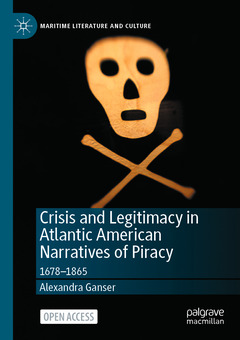Description
Crisis and Legitimacy in Atlantic American Narratives of Piracy, 1st ed. 2020
1678-1865
Maritime Literature and Culture Series
Language: English
Publication date: 09-2020
Support: Print on demand
Publication date: 08-2020
289 p. · 14.8x21 cm · Hardback
Description
/li>Contents
/li>Biography
/li>Comment
/li>
This Open Access book, Crisis and Legitimacy in Atlantic American Narratives of Piracy: 1678-1865, examines literary and visual representations of piracy beginning with A.O. Exquemelin?s 1678 Buccaneers of America and ending at the onset of the US-American Civil War. Examining both canonical and understudied texts?from Puritan sermons, James Fenimore Cooper?s The Red Rover, and Herman Melville?s ?Benito Cereno? to the popular cross-dressing female pirate novelette Fanny Campbell, and satirical decorated Union envelopes, this book argues that piracy acted as a trope to negotiate ideas of legitimacy in the contexts of U.S. colonialism, nationalism, and expansionism. The readings demonstrate how pirates were invoked in transatlantic literary production at times when dominant conceptions of legitimacy, built upon categorizations of race, class, and gender, had come into crisis. As popular and mobile maritime outlaw figures, it is suggested, piratesasked questions about might and right at critical moments of Atlantic history.
Alexandra Ganser is Professor of American Studies at the University of Vienna, Austria, where she also heads the interdisciplinary research platform and PhD program “Mobile Cultures and Societies” and co-directs the Centre for Canadian Studies. Focusing on mobility in North American literature and culture in her work, she has received research awards and grants in Austria, Germany, the UK, and the US.




